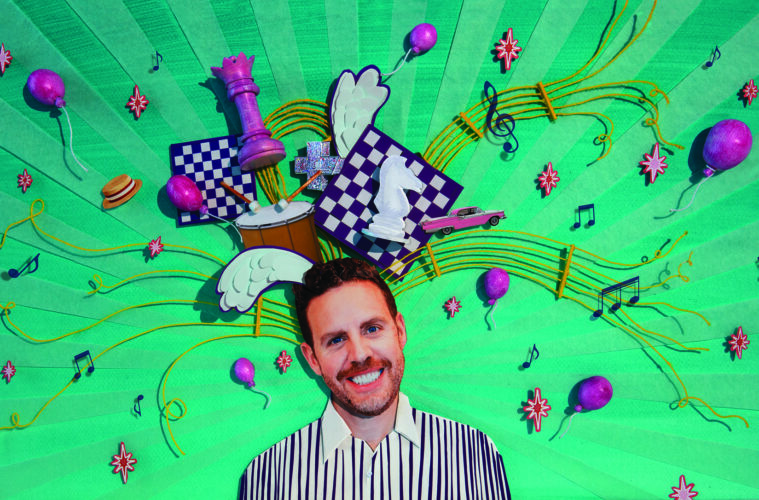Robert Drury’s experiential event company invites people into real moments of the shows they love.
In the midst of the COVID-19 lockdown, Robert Drury ’99 started an in-person experiential event company. While he acknowledges this “may not have seemed like the most logical step,” it was actually a calculated move for the marketing professional. Drury anticipated that as the world emerged from the pandemic, people would be hungry for connection and live events, and he had 20 years of experience to back it up.
As managing director of TV and media at CSM, a global integrated marketing agency, Drury developed and spearheaded major experiential events for shows like Stranger Things, The Walking Dead, and The Handmaid’s Tale. Now, he’s bringing this combination of innovation and experience to his own company, Cartwheel and Co. Marketing.
There was a real backlog of ideas and pent-up energy, and it exploded; 2022 saw a massive boom in events.
Robert Drury ’99
Working at AOL after graduating as an economics major at Colgate, Drury first learned about event marketing, which has since become experiential marketing. “It combines everything I’m interested in,” he says.
Throughout two decades at CSM, he led the growth and evolution of this burgeoning industry — which screeched to a halt when COVID-19 hit in 2020 and the pandemic decimated live events companies. While many shuttered, Drury anticipated that experiential marketing would bounce back. “The pandemic felt like a blip in its growth, as opposed to being earth shattering,” he says. “It was just a matter of time” until people would be eager for a return to in-person events. “It was a really good time to lay the foundation for Cartwheel.”
Drury created a website, informed his CSM clients that he was striking out on his own, established the company infrastructure, and devised a sustainable, scalable agency model that capitalized on the flexible work options and gig economy normalized by the pandemic. He started with a lean team of two and hired freelancers to tailor the company to specific projects. “We use the term ‘accordion style’; our team compresses, expands, and contracts along with our projects, which gives us a much lower overhead and takes a lot of risk out of any given quarter,” Drury says.
His preparation paid off. Developing the company during the pandemic meant that as soon as people were ready for in-person events, Cartwheel was ready for people. “There was a real backlog of ideas and pent-up energy, and it exploded; 2022 saw a massive boom in events,” he says. “If I had been just one month in at that point, I don’t think I would have been able to handle the volume of requests we got.”
Cartwheel was inundated with opportunities to pitch campaign ideas for major TV and film clients. “Everything is a creative best-idea-wins grudge match. It can be extremely competitive, but also very rewarding,” Drury says. “A lot of what I do all day is come up with new ideas to engage people in TV shows, which is a ton of fun.”
The first project he and his team took on was an experiential event for the Netflix hit The Queen’s Gambit … they created a life-sized chessboard … complete with a 15-foot pink queen.
The Queen’s Gambit, for which Cartwheel won a bid to create an immersive experience to draw people into the world of the show. During Emmy season, they created a life-sized chessboard at the Grove in Los Angeles, complete with a 15-foot pink queen, open-play chess tables, and a match between two women: a 12-year-old prodigy and a 19-year-old master. The installation drew 7,000 people in three days. “It was a good calling card,” Drury says. “We were able to say we just worked on a really big show for a big network — and we were off to the races.”
The success of that event led to more campaigns, for The Marvelous Mrs. Maisel, WrestleMania, and Outlander, among many others, and Cartwheel’s client roster expanded to include some of the industry’s heaviest hitters like Prime Video, NBCUniversal, Lionsgate, and STARZ. With just $7,500 in start-up costs, the company generated $6.28 million in revenue in 2022 and was named Newcomer Agency of the Year by Ad Age.
So, what’s the draw for these immersive events? Why do they attract crowds who wait for hours just to get in? Drury understands the allure: “When I was a kid, you’d like a TV show and that was it. Now, there are so many opportunities for fans. Experiential events give fans the chance to see and feel the worlds of the shows they love.” The motivation for attending — and developing — such events goes beyond fandom, he says: “It’s about creating moments for people, from grandparents to kids, to experience together.”

